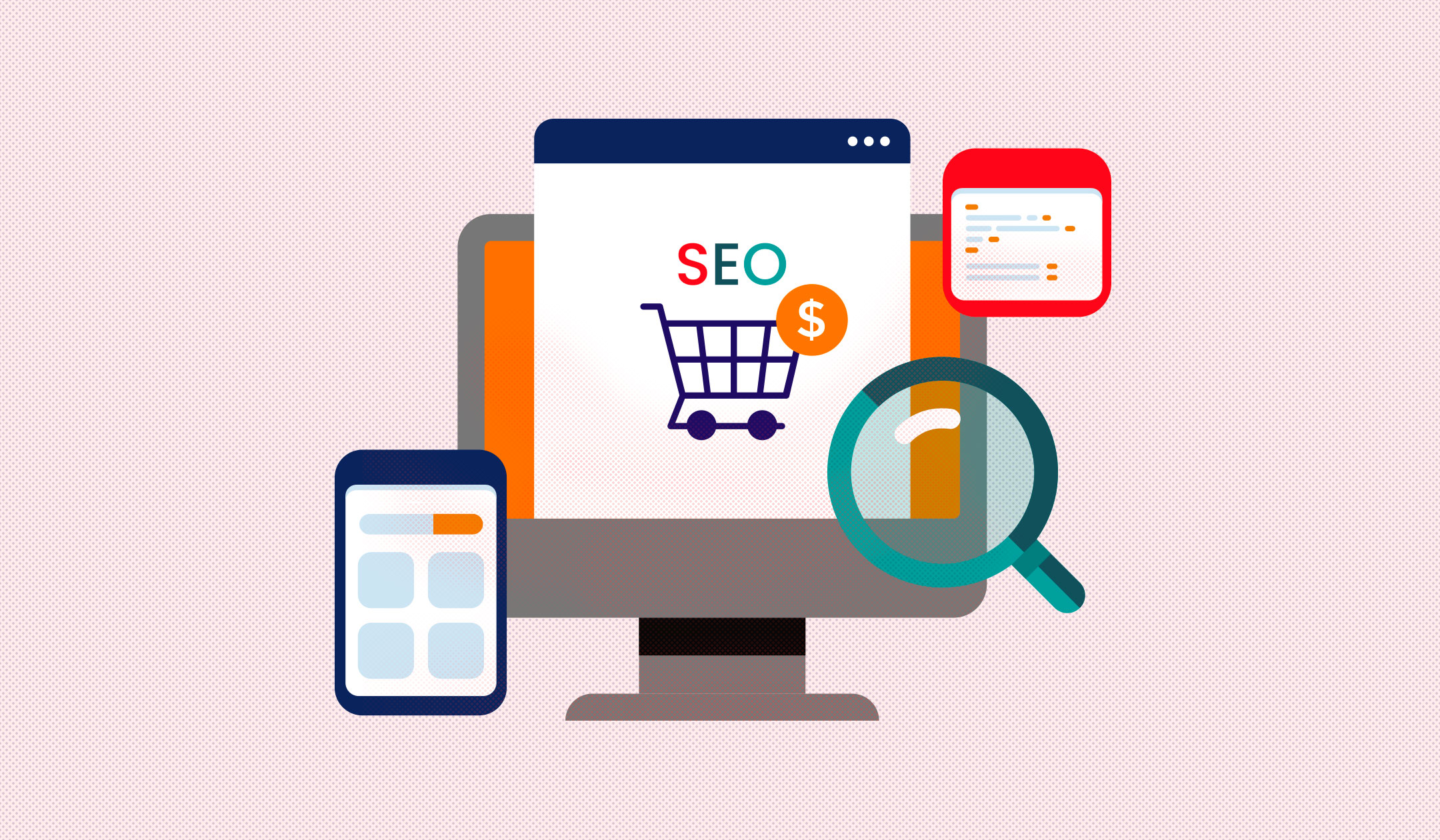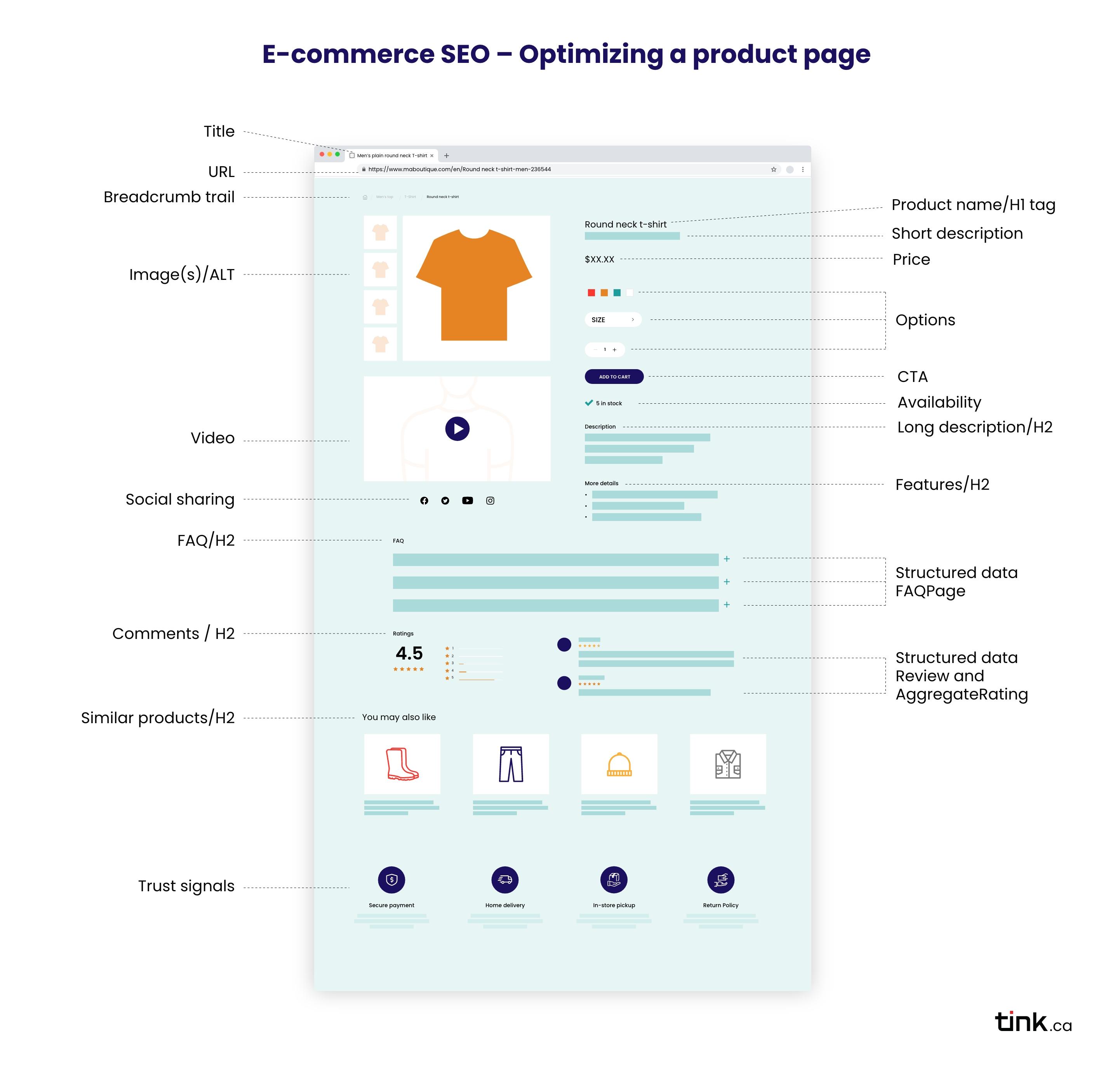E-commerce and SEO: a best and lucrative practices guide

When your company wants to increase its online sales, paid advertising is often the prioritized lever . However, a well parameterized SEO can sometimes obtain more than significant results.
Why is e-commerce SEO important?
More than a third (37.5%) of all transactional website traffic comes from organic search engine results, and close to 24% of e-commerce purchases are directly related to organic traffic. In other words, organic referencing (SEO) is a strategy that online businesses can use to optimize their visibility, website traffic, and conversion rates.
Even though the basic principles of SEO are the same for all websites, e-commerce SEO requires some more advanced optimizations, especially when it comes to structuring a product page.
In the following article, our SEO experts give you some keys to optimize your transactional websites.
E-commerce SEO best practices checklist
Voici quelques pistes de base pour vous créer un SEO efficace:
- Keyword research focused on search intent
- Tree structure based on targeted keywords, which will provide users with an optimal browsing experience
- Technical structure free of all blocking factors, to allow search engines to crawl the site effectively (accessibility, no duplicate URLs, XML sitemap, loading speed, etc.)
- On-page optimizations that ensure adequate keyword presence on category and product pages
- Store pages that support the site’s local SEO and indicate in-store product availability
- Blog posts that attract visitors based on various types of queries (comparison, advice, etc.) and that readers will want to share, thereby creating an opportunity to gain more backlinks
- Backlinks that enhance the brand’s expertise, authority, and trustworthiness in the eyes of Google
- Product listings imported into Google Merchant Center, which will make your products show up in Google Shopping
- Key performance indicators that make it possible to constantly readjust and improve the site’s organic attraction.
How to optimize a product page using SEO?
The product page is a crucial step in the user’s journey, since that’s where the conversion (i.e., the purchase) takes place. It’s also a potential landing page, for users coming directly from search results. Make sure to pay special attention to a few key elements in order to increase organic web traffic and conversion rates for these pages:
Product naming
Brand, model, colour, size, material . . . Ideally, these features should appear in the H1 and Title tags to prevent possible duplication within the catalogue.
Visuals
Showing a product from different angles can help convince the buyer to make a purchase. For this reason, it’s a good idea to use high-quality, detailed photos. However, you should limit the size of the images to help your site load faster. Don’t forget to include alternative text (alt tags) for all images and mention the name of the product in the file name. This will allow you to generate traffic via Google Images. YouTube videos can also help drive traffic to your site while making it possible to see products in action.
Content
A unique product description will strengthen organic referencing for the product page. Avoid using the suppliers’ descriptions and make sure to insert long-tail keywords. Being more specific, these will help attract high-quality traffic. Note that customer reviews can enrich a site’s semantic content. For this reason, you should encourage your customers to leave reviews, since they might convince other visitors to make a purchase as well.
Structured data
These semantic tags help Google understand the content of the product page so that it can inform its results pages. Product name, description, brand, price, review, availability . . . You can mark up each element in accordance with Google’s guidelines.

SEO issues you should consider as part of your e-commerce strategy
Choose an e-commerce CMS that’s SEO-friendly
Magento, Shopify, WooCommerce . . . Most e-commerce solutions respect Google’s guidelines and make it possible to build an e-commerce site adapted to organic referencing. However, you will need an SEO specialist to build an organic traffic acquisition strategy and ensure that all SEO features have been properly configured. You should also beware of product catalogues, which can generate duplicate content due to search filters or faceted navigation.
Adapt to market trends
An e-commerce site’s SEO must always be evolving to keep up with consumer buying behaviours. Tools such as Google Trends and Google Search Console can help you identify queries that are on the rise so that you can strategically optimize by creating new pages, renaming certain titles, etc.
Because every industry has its own seasonality, certain times of the year will have to be planned several months in advance. This let’s you create targeted content to showcase seasonal products. This is especially true in the retail sector, where it’s impossible to get around certain evergreen content: Christmas, New Year’s, the Superbowl, Valentine’s Day, Spring Break, Saint-Patrick’s Day, Easter, Mother’s Day, National Holidays, Back-to-School, Thanksgiving, Halloween, Black Friday, etc.
Calculate the ROI of e-commerce SEO
Measuring tools such as Google Analytics allow you to easily calculate revenues from organic traffic and therefore the profitability of the actions you’ve implemented. However, pay attention to your chosen attribution model: the decision to make a purchase is rarely made after a single visit. The user’s journey may involve multiple interactions with the website, from different sources, over a certain period of time. Therefore, it’s crucial to consider the conversions for which organic traffic has generated returning visits, without being the final traffic source before the purchase was made.
You want to set up an eCommerce strategy or optimize your SEO? Our teams of specialists are here to help you. Contact us to share your project!
